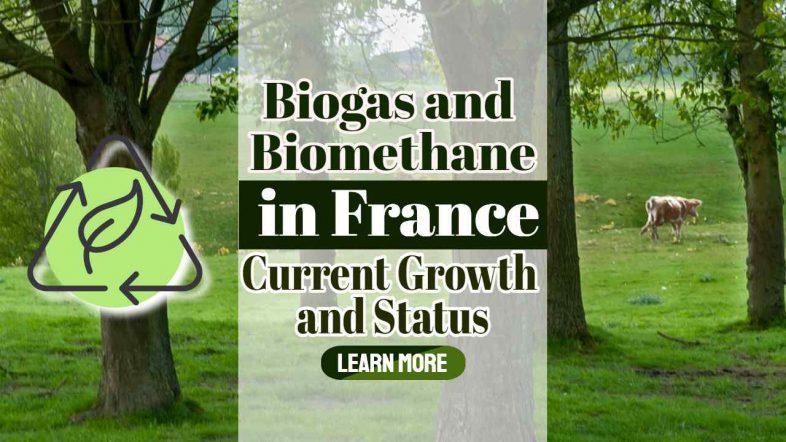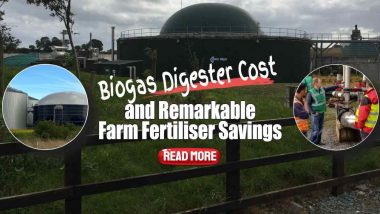Back in the spring of 2018, we said that biogas and biomethane output was about to grow in France as part of 15 point government plan, and we got that right!
France intends to increase the amount of biogas/ biomethane injected into the gas grid from almost nothing in 2017 to more than half of total production. That's despite the fact that the country lags far behind biogas pioneers such as Denmark and Germany, the sector is rapidly expanding.
According to the Ministry of Energy Transition, electricity production from biogas and biomethane also continues to rise, with 519 plants capable of producing electricity, representing a total generated power of 405 MW.
The status of biogas and biomethane market in France
France has only recently begun to develop its biogas sector.
The biomethane market in France has grown rapidly to be one of Europe's largest markets at the time the newest data was published in 2021. In a year of increasing demand for carbon and carbon-neutral products, the market in France for biomethane will in the near future offer exciting economic opportunities.
Although there have been challenges French government, financial and policy support for the anaerobic digestion industry remains helpful.
The Law on Energy Transition for Green Growth aims to increase the share of renewable gas in France's gas consumption to 10% by 2030.
Gas suppliers offer a feed-in tariff to biomethane producers to support the biogas plant industry. The government then compensates the gas suppliers. This offset is calculated using the difference between the costs of producing biomethane and the price of natural gas. It is currently set for a period of 15 years.
The policies allow for investment subsidies for research and equipment, as well as guaranteed prices for their bioenergy products, resulting in direct emissions reductions in the agricultural sector and a variety of subsectors such as transportation, waste, electricity, and heat.
What are the prospects for biogas and biomethane in France in 2022?
Biomethane is a highly dynamic industry that has dominated Europe in its capability to supply rising quantities of this form of renewable natural gas (RNG) for some years now. The biogas industry's continued growth in France has kept up with numerous changes in market conditions, regulations and tariffs. This is a climate where RNG gas operators can play an essential role in developing vital renewable gas resources.
This move to inject biomethane into the network is part of France's desire to accelerate the energy transition.
The Energy Transition for Green Growth Law (LTECV) sets a target of increasing the share of renewable gases in French natural gas consumption to 10% by 2030, while the new Long Term Energy Schedule (PPE) sets an injection target of 7 to 10% biomethane by 2030, as well as a target for biomethane injection of 14 to 22 TWh by 2028.
The EU imposes a carbon tax, which is offset by investment in the EU ETS carbon offsetting scheme. The CO2 value trajectory, which was €44.60/tCO2 in 2018, is expected to reach €86.20/tCO2 in 2022. The French Energy Transition for Green Growth act (LTECV), is projected for a CO2 value set at €100/tCO2 in 2030.
The resulting Domestic Consumption Tax on Natural Gas (TICGN) is calculated by considering the amount of CO2 emitted when using natural gas (approximately 0.19 tCO2 /MWh). After that, the TICGN is applied to natural gas consumption. Due to a number of exemptions, this tax, which is part of the government's budget, only applies to a portion of French consumption, estimated to be around 50% of the total.
Business opportunities in biogas and biomethane
Although there are still, even in France, several barriers to the full development of the biogas plants of the biogas industry, the adoption of new measures and the actions of organisations and companies create in France an excellent business opportunity.
The situation is changing as France begins on its path toward a carbon-neutral society.
Statistical and data analysis on the Paris market show that France's biomethane market is extremely dynamic with tremendous potential. The trend among socially responsible French companies is to try to cut fossil fuel usage by 50% as rapidly as possible. A new research report by ADEME has even examined the feasibility of creating a 100% renewable gas blend using Biogas plant biomethane by 2050.

Survey of the biomethane sector in France in 2021
An overview is available in the 6th edition of “Renewables” for 2023. This report focuses on recent statistics published on France's biomethane market dynamics. Energy company Teréga provides an analysis of the emerging renewable fuels sector in the report.
According to the data, France now has 1,075 biogas producers. Its total was 20% and it was used to inject biomethane into networked networks.
The astonishing achievement is that these numbers almost doubled over just one year from 2019 to 2020 (123 locations in 2019). Several other studies confirm the rapid development.
Back in 2019, the French government said that France was ready to provide 7 to 9 billion Euros ($8-10 billion) in subsidies for the development of biogas plant facilities for renewable gas. But it would only do this if the industry was to substantially lower its costs. It must have done so, as the money seems to have been flowing.
Ten years ago, it was estimated that biomethane produced by the methanisation of agricultural and other biological waste would cost roughly four times as much as natural gas imported by pipeline or LNG tanker from countries such as Russia, Norway, Algeria, or Qatar. But, today as in other renewable energy sectors technology has improved and costs have fallen.
A common concern expressed by those we surveyed who were asked about the possible drawbacks of using biogas and biomethane was that resources that would have been better utilised for other reasons are being diverted to biogas production.
The circular economy and biogas production on farms
The circular economy is an economic model which aims at producing goods and services sustainably by limiting the use and wasting resources such as energy. In addition to a linear economic model, this new approach reverts from a linear one by implementing an acyclical economy model.
To achieve the highest level of sustainability in agriculture, all agricultural waste should be composted and used as fertiliser.
The development of biomethane feeds the entire ecosystem and helps stimulate regional economies and protects nature. It is particularly attractive to farmers as their businesses can expand and diversify.
With 17 biogas plants in operation, ENGIE Bioz is one of France's leaders in renewable gas production.
French biogas and biomethane industry 2022
The Biomethane Observatory had developed more than 200 Biomethane units by 2020. But many completions were delayed subsequently over the COVID-19 crisis. The financial crisis of 2018 also affected the industry badly by:
- slowing biogas plant operations, or closing some businesses, or
- reducing the quantity of organic foods available through restaurants closing.
Nevertheless, French governments have adopted policies which continue that will help the sector and limit the risks.
Objections Raised by Local Communities
Overcoming local resistance to new biomethane projects is based on identifying consumer perceptions and attitudes toward the use of biogas/biomethane in France. Concerns about odours are understandable among locals who will be close to new biogas plants. As always worries about the intensity of additional biogas plant traffic need to be addressed and data made available on anticipated additional vehicle traffic on local roads.
Biogas Plant developers in France have sought to assess the features of biomethane-based gas products attractive to French consumers. They have determined that there is a likelihood of consumers choosing to purchase biomethane-based gas in the future. It will be made from agricultural waste.
If it can do that at a lower price point than for other competing fuels, which is a real possibility now due to the war in Ukraine. The profitability of biogas production and that of biomethane sales is surely assured.
By comparison, consumer value for gas products with carbon-offset features are not so popular when compared to gas that contains biomethane.
Regional Methanisation Units in France
Organic matter (agricultural waste) is collected in the vicinity of the methanisation Unit and can be of agriculture or industry origin, or of municipal authorities or local authorities.
A natural biochemical breakdown reaction with no oxygen produces biogas which can be upgraded (further purified) to biomethane and used in gas distribution systems. The digestate produced is then recovered to local soils and replaces natural fertilisers.
Energy for the good of the planet
Produced locally, biogas energy supports longer-term decarbonising energy transitions. The Biogaz company, for example, produces 100% renewable energy that reduces smog and improves air quality. Biogas plant methanisation allows the reuse and the reduction of chemicals for fertilising, resulting in better nutrients returning to the soil vital to organic development.
It has similar properties to gasoline and when burnt (combusted) is suitable for generating energy, power generation, and running automobiles.
Gas operators support biomethane injection into the grid
Biomethane is produced by purifying biogas to give it the same properties as natural gas. Biomethane is generally transported and stored using existing natural gas infrastructure (“the gas grid”) to serve end uses (heating, cooking, industry etc) or as fuel for transportation or to generate electricity, but it can just as easily be used for needs in the immediate vicinity.
Teréga contributes to France's growing biogas industry by providing access to the network and supporting the project owners with technical assistance and technical expertise. Biomethane is especially capable of providing agriculture with inputs and is technologically mature.
Methanisation of organic waste is something that Fench farmers are becoming very familiar with. This is a mature technology in France with limited risks.
Great “value creation” in the regions
The circular economy is an economic model that is aimed at generating products and services in ways that are sustainable.
Making biomethane from agricultural and household organic biowastes combines linear economic models with circular ones.
The development of biomethane feeds the entire ecosystem and helps stimulate regional economies and protects nature. It is particularly attractive to farmers as their businesses can expand and diversify.
Vallon Farm AD Plant, for example, is currently under construction. When completed, a maximum of 7,400 tonnes of cattle manure and maize silage per year will be anaerobically digested to produce 100 Nm3 biogas per hour. The biogas will be upgraded to 55 Nm3 biomethane per hour in the biomethane system before being injected into the natural gas grid. An efficient heat recovery system (CHP) is included in the plant. MICROFERM+ biogas installations can handle both liquid and solid waste streams, which are fed into the digester separately.
Obstacles to overcome
Despite growing biofuels and biomethane production, there are still many obstacles to its expansion in France.
A recent ATLANTE study describing the Advent of the Third Gas Revolution cites suggests, for example, that there are several ways for this problem to be solved and these are both in new technology implementations and others. It's important to address the problems and improve biogas industry growth.
What is biogas?
Biogas is produced from organic degradation in absence of oxygen. These are called “aerobic digesters”. The inputs resulting from the process include residue food crops, effluents of livestock production, intermediate crops and organic waste sourced from municipal and commercial enterprises. Biogas, therefore, has 100% renewable potential.
What is biomethane?
Biomethane is produced by biogas purification, giving it the characteristic qualities of natural gasoline. Biomethane can be pumped to a wide variety of applications in energy production, energy or transport fuels.
The development of biomethane feeds the entire ecosystem and helps stimulate regional economies and protects nature. It is particularly attractive to farmers as their businesses can expand and diversify.
The French government actively supports the growth of the industry
The French government has long supported biofuel and biomethane production. It also supports the market mechanism and various subsidies are enabling reduced production costs.
Original article as published on 30 April 2018:
Biogas and Biomethane Produced in France Set to Grow as Part of 15 Point Plan
The French government has seen the light and is aligning various policies to ensure that biogas and biomethane in France will grow rapidly as a result of a 15 point plan.
It was already set to ban all oil and gas drilling in 2040. Given that the nation's policy on Nuclear Power is very low-profile, and the nation does not have the same wind power resources available as for example the UK the French nation has little choice but to place a much higher reliance on biomass power, especially anaerobic digestion, biogas and biomethane. France is no different from elsewhere in needing to find a way to accelerate the introduction of renewable transport fuels either.
The result is that the AD industry can now look optimistically toward growth in Biogas and Biomethane in France. We have included article excerpts below to provide further details of moves in France toward a much greater uptake of Biogas and Biomethane in France.
France government readies policies to roll out biomethane
Biomethane in France: The French government said it will soon take measures to speed up the deployment of biomethane projects, such as a streamlined approvals process and easier access to project finance, so the country can use 10% renewable gas in its overall gas consumption by 2030.
In late March, France’s ecology minister Sébastien Lecornu presented 15 proposals that are likely to form the basis of a detailed plan to roll out biomethane production to farms across France and use the resulting gas in power generation, heating and road transport.
The proposals draw heavily on a government-commissioned policy paper presented last month by France Biomethane, a lobby group for the sector, and plans to dismantle a series of bureaucratic hurdles that have so far prevented fast growth in biogas production.
The 15-point plan aims to scale up public support for the sector, and lay out the regulatory framework for the use of biogas in road transport.
The government is also aiming to encourage the connection of smaller facilities to plant networks that feed into the gas grid and provide them the requisite finance. The plan also envisages much greater use of biogas in road transport and increased connection to plant networks. via EnergyCensus
The reliance on biomethane in France will not be raised significantly by the following ban, because French oil and gas reserves are tiny. Nevertheless, the following article excerpt does serve to reinforce the fact that the nation is fully committed to rapid decarbonisation, and in the not too distant future will rely on renewable energy.
France To Ban Oil And Gas Drilling In 2040
Earlier this month, French utility company Engie agreed to ditch natural gas as a power source by 2050, opting instead for biogas and renewable hydrogen to fulfil its green goals, according to a Reuters report.
“We will progressively make our gas greener so that by 2050 it can be 100% green,” Chief Executive Isabelle Kocher told reporters. “Most of the energy consumed is for heating, cooling and transport. By massively deploying green gas we could decarbonize all that.”
Engie has 70 biogas projects around the world, with just over half of them in France. The company has more projects lined up for approval, which would increase biogas production tenfold and generate millions of euros of new revenue. Engie sold most of its fossil fuel interests to Total and other oil majors this year as part of its green energy plan. via FranceBanDrilling
German group in 50 mln euro French biogas plan
HAMBURG, Feb 14 (Reuters) – A German joint venture said on Thursday it plans a series of 20 biogas production plants in France with investment totalling 50 million euros ($73.05 million).
The plants will largely be built for the food processing industry to produce biogas from food waste, said a spokesman for a consortium partner, German biofuels producer BKN Biokraftstoff Nord AG B9KG.DE.
“French food processors currently have to pay to remove large amounts of waste materials such as potato peelings, the concept is to turn this waste into biogas and earn profits,” he said.
The plants would have a capacity of at least 500 megawatts annually. The first was likely to be completed in one to two years depending on planning approvals being granted by French authorities, he said.
A new joint venture company France Biogaz Valorisation has been established by German firm Biostrom Energy, a unit of BKN, plus German renewable fuels investment company Beteiligungsgesellschaft Erneuerbare Energie and development company Sterr-Koelln.
Biogas is largely methane produced by processing organic and vegetable materials such as maize, silage or farm animal manure. Conventional gas is produced from fossil fuels such as coal.
The consortium will plan and develop projects and organise investment, with finance being provided by institutional investors and food processors.
The venture expects rising biogas demand in France, especially because of government moves to compel more renewable energy use. It says France’s biogas market is underdeveloped compared to Germany, where thousands of farmers have built small plants to generate extra income.
BKN said in November it would change its corporate focus to biogas and abandoned plans to build a 150,000-tonne annual capacity biodiesel plant. via Frenchbiogasplan
The above is further evidence of the roll-out of biomethane in France.
Wet Waste Management Global Market – Overview Shows Rapid Anticipated Growth
The Global Wet Waste Management Market is growing at a rapid pace. According to a recent study report published by the Market Research Future,
The global market of Wet Waste Management will grow rapidly over the forecast period. The market is forecast to witness steady growth by 2027, which will be a surplus growth at a moderate CAGR during the projected period (2016 -2027).
Wet waste refers to organic waste, usually heavy due to dampness. Wet waste can be segregated as biodegradable and non-biodegradable. Wet waste management is the process of composting the waste for use as manure, biogas etc.
The global wet waste management market is majorly driven by the rising awareness for wet waste management. The market is also driven by the introduction of new wet waste management technologies such as waste to energy solutions.
Awareness for environmental sustainability and an increase in the use of eco-friendly fuels in the residential and commercial segments are contributing to the growth of the market. The rise in government initiatives for spreading wet waste management awareness is further expected to propel market growth.
However, the growth of this market is restrained by a lack of participation from industries and sectors such as commercial, food and beverage, and healthcare.
Lack of treatment plants and landfill sites is also projected to hamper the growth of the global wet waste management market over the forecast period.
Food waste is processed via Anaerobic Digestion to produce sustainable energy.
This is a natural process where plant and animal materials (biomass) are broken down by micro-organisms in the absence of air. Naturally, occurring micro-organisms digest the biomass which releases a methane-rich gas that can be used to generate renewable heat and power.
This helps cut fossil fuel use and to reduce greenhouse gas emissions. The essence of the wet waste management industry has emerged to become much more than just removing waste.
Organic waste is segregated from non-recyclable and inorganic waste.
This allows cities to make use of organic waste to create compost for public areas. There are even some cities that package and sell the compost to make money.
These items can be reprocessed and recycled and will be used in producing new products. This method has helped reduce further consumption of natural resources and at the same time lowers the ultimate need for waste disposal. via WetWasteManagement







thank you for sharing us the knowledge, its really a big help, more power, GOD bless
Très bon blog. Je vous remercie. La puissance du biogaz n’est qu’une façon de produire de l’énergie renouvelable. Vous pouvez envisager d’obtenir des chauffe-eau solaires pour chauffer votre eau. Si vous êtes dans une région qui ne doit pas s’inquiéter des températures de congélation, vous pouvez obtenir un système qui fera circuler l’eau à travers un chauffe-eau solaire avant de le pomper dans votre maison. Cependant, vous devriez toujours avoir un chauffe-eau traditionnel comme appoint pour les périodes où le soleil ne sortira pas ou si vous allez utiliser beaucoup d’eau chaude.
We like your commenting but please only comment in the English language, in future.
I have been following this article, so can you please send me a list of french companies who do this work.